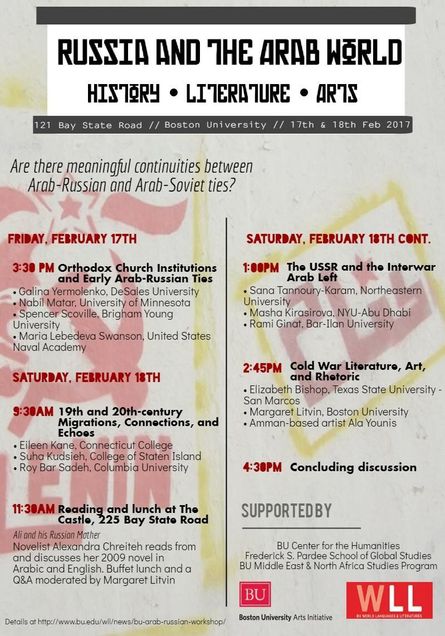BU Workshop on Arab-Russian and Arab-Soviet Ties: Literature, History, and the Arts
This two-day research workshop in February 2017 brought together 13 participants from across history, literature, and the arts: specialists in different disciplines and periods who might not ordinarily engage with each other’s work. The program included presenters from universities on the East Coast as well as Minnesota, Utah, Israel, Jordan, and the United Arab Emirates, an at different career stages, from graduate student to full professor. In an interdisciplinary collaboration at BU, generously sponsorship came from the Pardee School, MENA Studies, Provost’s Arts Initiative, and BU Center for Humanities as well as WLL.
 The first day’s panel focused on the Russian Orthodox Church as a vector for early contacts. What did travel literature from both directions reveal about Arab-Russian contacts in the seventeenth century? Why did Catherine the Great have better luck finding anti-Ottoman allies among Arab Muslims than among Arab Christians? What domestic political imperatives led to the foundation of the Imperial Orthodox Palestine Society in the late 19th and early 20th century? The next day’s discussions turned to unexpected nineteenth-century connections: Jewish migrants (on “pilgrimage visas”) to the Arab Ottoman lands long before Zionism, the life story of an Egyptian scholar who traveled to teach Arabic in St. Petersburg in 1840, and the refractions of late Tsarist Russia, especially its Muslims, in the Cairo-based journal Al-Manar (The Beacon). The last two panels focused first on the Arab communist movements in interwar and immediate postwar Palestine, Lebanon, and Egypt, then on Iraqi and Egyptian self-presentations in dialogue with the USSR during the Cold War period, culminating with a multimedia presentation by Amman-based artist and curator Ala Younis on two conflicting Egyptian films on the Aswan High
The first day’s panel focused on the Russian Orthodox Church as a vector for early contacts. What did travel literature from both directions reveal about Arab-Russian contacts in the seventeenth century? Why did Catherine the Great have better luck finding anti-Ottoman allies among Arab Muslims than among Arab Christians? What domestic political imperatives led to the foundation of the Imperial Orthodox Palestine Society in the late 19th and early 20th century? The next day’s discussions turned to unexpected nineteenth-century connections: Jewish migrants (on “pilgrimage visas”) to the Arab Ottoman lands long before Zionism, the life story of an Egyptian scholar who traveled to teach Arabic in St. Petersburg in 1840, and the refractions of late Tsarist Russia, especially its Muslims, in the Cairo-based journal Al-Manar (The Beacon). The last two panels focused first on the Arab communist movements in interwar and immediate postwar Palestine, Lebanon, and Egypt, then on Iraqi and Egyptian self-presentations in dialogue with the USSR during the Cold War period, culminating with a multimedia presentation by Amman-based artist and curator Ala Younis on two conflicting Egyptian films on the Aswan High  Dam, putting them in the context of Egyptian political history as well as Soviet traditions of propaganda film.
Dam, putting them in the context of Egyptian political history as well as Soviet traditions of propaganda film.
The academic panels attracted interested specialists from BU and area universities, but a lunch event on Saturday, Feb 18 drew a wider student audience. This was a reading at The Castle by local novelist and scholar Alexandra Chreiteh from her recent novel Ali and his Russian Mother, set during the evacuation of Russian and post-Soviet citizens during Israel’s 2006 war with Lebanon. Chreiteh, a Russian-Lebanese assistant professor of Arabic literature at Tufts, did not shy away from discussing the controversial and ambiguous aspects of her novel in the very candid Q&A that followed.
